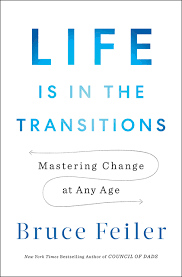Covid 19 has been an enormous disruptor for most people in the entire world – a change from what we’ve been doing and perhaps expecting to do. The normal expectation is that we’ll have a linear life – that we’ll keep going in the same direction as in the past and hopefully live happily ever after. Not so now.
We’ve all experienced disruptions in the past. What are they? The most well-known list of disruptions is the Holmes-Rahe life stress inventory. It includes changes in health, relationships, beliefs, work, and identity. The list is long. Any of these can disrupt your life.
In his book “Life Is in the Transitions” Bruce Feiler describes the results of his in-depth interviews of 225 people. He found that on average people experience a disruption every 12 – 18 months.
Feiler uses the term “lifequake” to describe a serious life-changing disruption. On average people experience 3 – 5 of these in their lifetimes. The Covid 19 virus can disrupt multiple areas of our lives all at once. For many of us, it is a lifequake.
How did we handle previous disruptions and lifequakes in ourlives? We generally found a way to adapt, although in some cases it could have taken years. Here are some of the strategies that Feiler describes that people have used as they have transitioned from the “before” to the “after”:
- Moving from resistance to acceptance of the new situation (think of the 12-step program)
- Dealing with emotions – fears of different kinds
- Giving up old mind-sets, being creative, and trying new things (including writing/journaling)
- Ritualizing change – marking an end and beginning
- Launching / Unveiling your new self and composing a new story for your new life
Many of these transitions, especially if they result from lifequakes, can take considerable time to accomplish. They are facilitated by help and support from others.
Are you in a lifequake now? What do you plan to do about it?

